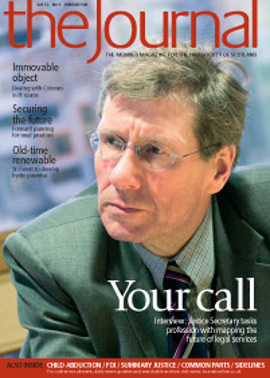Watching their diets

Court timetabling
No doubt this matter will be looked at in the Civil Justice Review under the Lord Justice Clerk. It is worth noting observations in two recent decisions. In Billig v Council of the Law Society of Scotland [2007] CSIH 86; 2007 GWD 40-690 the Inner House referred to the article 6 ECHR obligation to dispose of matters within a reasonable time, in discussing a party’s obligation to keep the court appraised as to its intentions regarding an appeal: if prompt intimation was not given that a diet was not to proceed, it was likely that judicial resources would be wasted and other cases unnecessarily delayed.
In AppA UK v Scottish Daily Record [2007] CSIH 82 the court allowed an appeal against the discharge of proof, observing that once a diet was assigned, the efficient administration of justice required the proper use of court resources whilst having regard to the interests of justice. If a date turned out to be unsuitable, the sooner a motion to discharge was made the better, and the greater chance of it succeeding. Delay might result in the motion being refused. As has been said before, parties sometimes overlook that ultimately it is the court that determines whether a diet assigned is discharged. This decision, in particular, gives some justification for that principle.
Accuracy of the instance
In Royal Insurance (UK) v Amec Construction Scotland [2007] CSOH 179 the pursuers were not designed in the instance as suing in the capacity of trustees, albeit it was averred in the record that they did so. Lord Emslie first noted that the pursuers’ capacity to sue as trustees was entirely separate from their corporate capacity. The pursuers had throughout held the necessary capacity and title to pursue the claim. They accordingly had title to sue. However, an instance which omitted to state the capacity in which a party sued was defective and incompetent.
Amendment to introduce new party
In McAllister v Scottish Water 2007 GWD 39-684 the pursuer raised an action against an authority which at the time had responsibility for roads and sewers. Subsequently, the pursuer amended to substitute another authority and the action proceeded against that party for a while. The pursuer was advised that the obligations had been taken over by the present defenders. He failed to take any steps in this regard for five months. The defenders sought dismissal as the action was time barred. The pursuer argued that the defenders were not brought in by amendment, but rather by operation of the statute transferring the relevant obligations. Prescription did not accordingly apply. Sheriff Principal Kerr dismissed the action. It did not matter that the relevant obligations had been transferred to the present defenders. They were entitled to the protection given by the statute. Whilst potential liability might have transferred, this was not the same as the transference of a right of action.
Recovery of documents
In two recent Outer House decisions, Hendry v Taylor and Sons [2007] CSOH 178; 2007 GWD 36-624, and Wilkie v DB Stuart [2007] CSOH 197, motions for recovery of medical records were opposed as fishing, no averment being made of the pursuer suffering from any injury predating the accident. Both motions were granted. The defenders were entitled to investigate and if necessary challenge the assertion that as a result of the incident the pursuer had sustained injury preventing any future employment, implicit in which was that prior to the incident, the pursuer had been in good health and would have worked to normal retirement age. These were issues in controversy and the defenders were entitled to recover the records to give them the opportunity to investigate. Further, the pursuers’ medical witnesses would have had sight of the records. It was appropriate that the defenders’ experts had similar access.
On the issue of recovery of documents generally, in Degrémont SA v Caledonian Environmental Services [2007] CSOH 203 the defenders objected to certain calls in a specification, on the basis that the record had not closed. The pursuers indicated that recovery of the documents would assist their fully setting out answers to the counterclaim. Lord Brodie observed that there was no criticism of the extent of the calls or that their approval would result in the defenders requiring to undertake onerous steps to produce the documents. As they were required to give adequate and specific answers to the claims, there was no reason for the preparation of the pursuers’ averments to be delayed by the defenders taking time to finalise their pleadings. Recovery should result in an earlier focusing of the issues. The specification was approved.
Appeals in family cases
In Muirhead v G [2007] CSIH 77; 2007 GWD 34-571 the Inner House again reiterated that in many cases involving children, there is little point in appealing a decision at first instance given the delay in matters reaching a conclusion. Far better to apply for a variation in the court at first instance.
Expenses
There have been a number of decisions which can be taken within this general heading. One issue is the basis on which a judicial award should be taxed. It seems to me that there is a trend of parties seeking that the basis should be the enhanced one of agent/client, client paying. In the last two months three decisions have appeared on the Scottish Courts website raising this issue. I had it raised before me in November, and ruled on another such case earlier in 2007.
R and S Muirhead v Julgem Property, Kilmarnock Sheriff Court, 19 November 2007 concerned the judicial expenses in a liquidation petition based on s 123(1)(a) of the Insolvency Act 1986 (21 day demand for payment). It was conceded eventually that the petition was ill founded. However, in the interim a provisional liquidator had been appointed. Sheriff Ireland observed that whilst he did not consider the tests for the enhanced basis of taxation had been satisfied, he remained uneasy as to the institution of proceedings being used as a form of diligence to put pressure on the respondents. It does not seem to me beyond imagination that such use of the petition process, if found to be unjustified, could result in expenses being taxed on the enhanced basis.
In AppA (UK) v Scottish Daily Record [2007] CSOH 196 Lord Macphail did authorise taxation on the enhanced scale. Long lists of witnesses being lodged, none of whom were precognosced, failure to make the appropriate admissions, an unsubstantiated large increase in the sum sued for, and inappropriate instructions to their advisers, all justified such authorisation.
In UPS Supply Chain Solutions v Glasgow Airport [2007] CSOH 202 Lord Glennie also required to consider the issue. In directing that expenses in respect of part of the procedure should be taxed on the enhanced basis, his Lordship noted that following a debate a minute of amendment had substantially increased the sum sought under a head of claim. After two years’ delay, this claim was deleted again, it being accepted (the court inferred) that there was no legal basis for the claim. The vast increase in the sum sought had resulted in the other side incurring expensive expert advice and the litigation had been unnecessarily delayed.
Greenan v Courtney [2007]
CSOH 200; 2007 GWD 40-702, is mentioned as an example of a case where, notwithstanding the defender was an assisted person and in receipt of benefit, modification of liability in terms of s 18(2) of the Legal Aid (Scotland) Act 1986 was refused having regard to her conduct of the litigation.
As a matter of procedure, in Campbell v Double Group Contracts Ltd [2007] CSOH 201, Lady Dorrian decided that a note of objections to an auditor’s report following taxation could only deal with matters actually at issue at the taxation.
In Dundee City Council v D 2007 GWD 39-667, a reporting officer and curator ad litem appointed in applications for parental responsibility orders sought to have their account for acting remitted for taxation. Sheriff McCulloch refused on the basis that in terms of reg 10 of the Curators ad litem and Reporting Officers (Panels) (Scotland) Regulations 2001 the authorities paid these officers such fees as they considered fit, and there was no power of taxation vested in the auditor notwithstanding rule 2.2 of the Act of Sederunt (Child Care and Maintenance Rules) 1997.
Antisocial behaviour – closure orders
In the application in respect of 174 Elgin Drive, Glenrothes, Kirkcaldy Sheriff Court, 12 October 2007, Sheriff Holligan observed that deciding whether a person had engaged in antisocial behaviour at premises, and use of the premises was associated with significant and persistent disorder or nuisance, the burden of proof lay on the applicant and the standard was one of balance of probabilities. Anonymous hearsay evidence was led in support of the application – evidence of some importance. Sheriff Holligan considered that its being anonymous was a factor in determining the weight to be given to such evidence. The persons who attended the premises had a tendency towards violence and the witnesses who sought anonymity, all local residents, were fearful. Details were given as to the manner in which these statements were taken. They all detailed similar behaviour and fitted the other information from direct sources before the court.
Sheriff Holligan considered that the order was necessary. The conduct had continued for a significant period notwithstanding visits from police and officials. The only respite was when the occupants were in custody. Sheriff Holligan then considered the requirement that such an application be determined no later than the second court day after the application is made (Antisocial Behaviour etc (Scotland) Act 2004, s 30(4)), and the power to postpone determination in terms of s 30(5). He considered that the court should have regard to the timetable set out in the legislation, but this did not prevent the court adjourning at common law if Convention rights so dictated. This also included the time necessary for a court to consider its decision. He further considered that there was a resultant obligation to give full disclosure by an applicant to a respondent.
The usual caveat applies. Belated best wishes for 2008.
UPDATE
Since the last article McGhee v Diageo plc (November article) has been reported at 2007 SLT 1016, Tonner v Reiach and Hall (July) at 2007 SLT 1183, North Lanarkshire Council v Crossan (November) at 2007 SLT (Sh Ct) 169, Mahmood v Mahmood (September) at 2007 SLT (Sh Ct) 176, and Accountant in Bankruptcy v Butler (November) at 2007 SLT (Sh Ct) 200.
In this issue
- More than just a new year
- Let youth have its say
- "You sort it out"
- A Colossus in the room
- ARTL cometh
- Letter from South Africa
- Lay justice reborn
- Power flows
- Year of the Commission
- Down to brass tacks
- Step up for Brussels office
- Small is doable
- Watching their diets
- 2008: let the fun commence
- Act going to plan
- Preferential treatment?
- Giving it the works
- Scottish Solicitors' Discipline Tribunal
- "Charity begins at home" - but does it?
- Website reviews
- Book reviews
- Freedom has its boundaries
- Pointing which way?
- There may be trouble ahead






